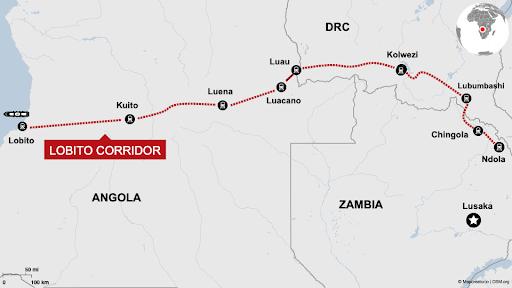America's Bold Move in Africa: Reviving the Lobito Corridor to Counter China's Mineral Dominance
The global demand for critical minerals has sparked a strategic race between the US and China, with Africa at its epicenter.
The global demand for critical minerals essential to modern technology and infrastructure has ignited a strategic race between the United States and China, with Africa at its epicenter. These minerals, including cobalt, lithium, and rare earth elements, are indispensable for producing electric vehicles, renewable energy technologies, and advanced weaponry. While China has dominated the African mineral market for over a decade, the United States is mounting a significant effort to reclaim influence, starting with the revitalization of the historic Lobito Corridor railway.
China's Dominance in African Minerals
For over ten years, China has been deeply entrenched in Africa, investing billions in infrastructure to extract and process the continent's vast mineral wealth. China's state-owned companies have been pivotal in developing ports, railways, highways, and telecommunication networks, creating a robust supply chain to transport minerals back to China. As a result, Beijing now leads the global extraction and refining of critical minerals, leaving little room for competition.
America's Strategic Comeback: The Lobito Corridor
In response to China's dominance, the Biden administration has pledged $360 million to revive the Lobito Corridor railway, an essential infrastructure project connecting the Democratic Republic of Congo (DRC) and Zambia to the Atlantic Ocean via Angola. This initiative aims to enhance the transportation of critical minerals, such as copper and cobalt, from the mineral-rich regions of the DRC and Zambia to international markets.
The Lobito Corridor, originally constructed in 1905 by Belgium and Portugal, fell into disrepair during Angola's civil war. Now, with substantial investments from private investors and the African Development Bank, the railway is set to undergo significant renovations. The project envisions transforming the railway into a value chain, fostering business development and commercial activities along its route, ultimately creating new towns and economic hubs.
Geopolitical Implications and Challenges
While the U.S. is making strides with the Lobito Corridor, China is not idle. Beijing is negotiating to take over the operations of the Tanzania-Zambia Railway Authority (TAZARA), a line that runs from central Zambia to the port of Dar es Salaam in Tanzania. China has already offered $1 billion to refurbish and operate the railway, potentially linking it to the cobalt-rich Katanga region in the DRC, thereby securing a direct route for critical minerals to Asia.
Both corridors, Lobito and TAZARA, traverse regions fraught with conflict, disease, and political instability, posing significant risks to investors. The DRC, in particular, has been plagued by insurgencies and a lack of federal control, complicating efforts to establish stable and secure supply chains.
A Window of Opportunity for the U.S.
The International Energy Agency (IEA) predicts a massive surge in demand for minerals like nickel, cobalt, graphite, and lithium by 2040. The U.S. aims to leverage this growing demand by establishing a more reliable and diversified supply chain through the Lobito Corridor. This strategy not only seeks to counter China's influence but also to foster stronger ties with African nations at a time when China's foreign direct investment in Africa is declining.
Conclusion
As the global race for critical minerals intensifies, Africa remains a key battleground. The United States, through the revival of the Lobito Corridor, aims to reclaim its stake in Africa's mineral wealth and counter China's longstanding dominance. However, the success of this initiative hinges on overcoming significant geopolitical and logistical challenges in a region historically marked by instability. The coming years will reveal whether America's bold strategy can reshape the landscape of global mineral supply chains and strengthen its geopolitical standing in Africa.






